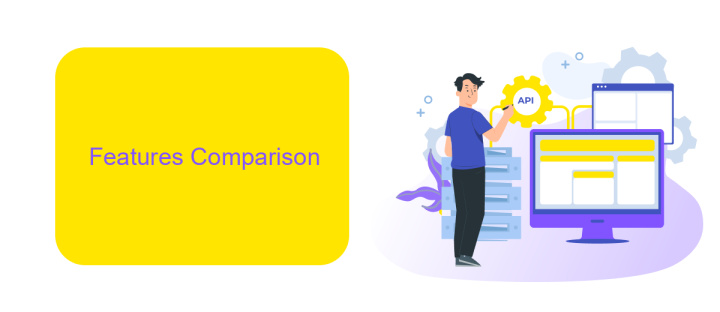IFTTT Vs Do
In today's interconnected digital landscape, automating tasks can significantly enhance productivity and streamline daily routines. IFTTT (If This Then That) and Do are two popular automation tools that offer unique features to help users create seamless workflows. This article delves into a comparative analysis of IFTTT and Do, highlighting their strengths and weaknesses to help you choose the right tool for your needs.
Introduction
In the modern digital landscape, automation tools have become essential for enhancing productivity and streamlining workflows. Two popular platforms that have gained significant attention are IFTTT and Do. Both services offer unique capabilities for automating tasks and integrating various applications, but they cater to different user needs and preferences.
- IFTTT (If This Then That): Known for its simplicity and wide range of applets, IFTTT allows users to create custom automation by linking various services and devices.
- Do: Focuses on providing quick and straightforward automation, often through a more user-friendly interface, suitable for those who need fast results without complex configurations.
- ApiX-Drive: A versatile integration service that can complement both IFTTT and Do by offering more advanced and customizable automation options for businesses and individuals.
Understanding the strengths and limitations of IFTTT and Do is crucial for selecting the right tool to meet your specific needs. Whether you are a casual user looking for simple automations or a business requiring robust integrations, these platforms offer valuable solutions to enhance your digital experience.
Features Comparison

When comparing IFTTT and Do, one of the primary distinctions lies in their approach to automation. IFTTT (If This Then That) offers a broad range of integrations, allowing users to create "applets" that connect multiple services and devices. This platform is highly versatile, supporting a wide array of applications and smart home gadgets. On the other hand, Do by IFTTT simplifies this process by focusing on user-friendly, single-action buttons, making it easier for those who prefer straightforward, quick automations without the need for complex setups.
Another key difference is in customization and flexibility. IFTTT provides more extensive customization options, enabling users to fine-tune their applets with various conditions and triggers. In contrast, Do is designed for simplicity, offering fewer customization options but ensuring ease of use. For those seeking a balance between these two extremes, services like ApiX-Drive can be beneficial. ApiX-Drive specializes in setting up integrations and automations, providing a middle ground with its straightforward interface and robust functionality, making it easier to manage complex workflows without the steep learning curve.
Use Cases

IFTTT and Do are both powerful tools for automation, but they serve different use cases. While IFTTT focuses on creating simple conditional statements to connect various services, Do is designed for quick, repetitive tasks that you can trigger manually with a single tap.
- Home Automation: IFTTT can automate smart home devices like lights, thermostats, and security cameras based on specific triggers, such as time of day or location.
- Social Media Management: Use IFTTT to automatically share new blog posts or YouTube videos across multiple social media platforms. Do can be used to quickly post updates or share content with a single tap.
- Productivity: IFTTT can integrate with calendar apps to send reminders or create to-do lists based on emails. Do can be used to log work hours or set timers with minimal effort.
- Business Integrations: Services like ApiX-Drive can enhance IFTTT by providing more complex integrations between business applications, ensuring seamless data flow and automation across platforms.
While IFTTT excels in background automation, Do is ideal for tasks that require immediate action. Depending on your needs, you can use either or both to streamline your daily activities and improve efficiency.
Pricing and Plans

When it comes to pricing and plans, IFTTT and Do offer different approaches to meet the needs of their users. IFTTT provides a free plan that includes basic functionalities and limited applets, which is suitable for personal use. For more advanced features and unlimited applets, IFTTT offers a Pro plan at a monthly subscription fee.
On the other hand, Do focuses on simplicity and ease of use, offering a straightforward pricing model. Do provides a free version with limited actions and integrations, while its premium plan unlocks additional features and advanced integration capabilities for a monthly fee.
- IFTTT Free: Basic functionalities with limited applets
- IFTTT Pro: Advanced features and unlimited applets
- Do Free: Limited actions and integrations
- Do Premium: Advanced features and more integrations
For those seeking more robust integration solutions, services like ApiX-Drive can be a valuable addition. ApiX-Drive offers seamless integration capabilities across multiple platforms, enhancing the overall efficiency of your automation processes. Whether you choose IFTTT or Do, considering a supplementary service like ApiX-Drive can significantly boost your workflow automation.
Conclusion
In conclusion, both IFTTT and Do offer powerful automation capabilities, each catering to different user needs. IFTTT excels in its extensive library of applets and its ability to connect a wide range of services, making it ideal for users looking for versatile and complex integrations. On the other hand, Do provides a more streamlined and user-friendly experience, perfect for those who seek quick and straightforward automation tasks.
When choosing between the two, consider your specific requirements and technical comfort level. Additionally, services like ApiX-Drive can further enhance your automation experience by providing seamless integration solutions tailored to your needs. Ultimately, both IFTTT and Do contribute significantly to simplifying and optimizing daily tasks, each with its unique strengths and features.
FAQ
What is the main difference between IFTTT and Do?
Can I use IFTTT and Do for business automation?
Do I need coding skills to use IFTTT or Do?
Are there any limitations to using IFTTT and Do?
What alternatives exist for more advanced automation needs?
Strive to take your business to the next level, achieve your goals faster and more efficiently? Apix-Drive is your reliable assistant for these tasks. An online service and application connector will help you automate key business processes and get rid of the routine. You and your employees will free up time for important core tasks. Try Apix-Drive features for free to see the effectiveness of the online connector for yourself.

